On the battlefield or in the boardroom, competitive intelligence almost always trumps the lack of it. The military figured that one out a long time ago.
Of course, marketers, too, need a glimpse into their rivals' plans. But we don't have it easy, do we, having to use Google and dozens of standalone tools for different aspects of our competitive research? Collecting marketing intelligence on competitors and rivals has long been a headache in search of an aspirin.
But now comes GrowthBot, a new chatbot from HubSpot co-founder and software developer Dharmesh Shah. He's built a promising—even if a bit unpolished—tool for marketers who are looking to better understand their competitors' strategies and tactics.
He explains why: "I'm curious about companies all the time (sometimes, they're competitors; sometimes, they're customers or startups I'm curious about). And, I got tired of having to use a bunch of different websites to get the answers I wanted. So, I built a bot so I could just ask it. Quick, convenient answers."

Let's see how helpful GrowthBot is, shall we? We'll investigate a few Boston-area companies—teams I'm familiar with and respect—to see what we can learn from the outside looking in via GrowthBot.
To follow along with these examples, you'll want to add GrowthBot to Slack or message hello to @GrowthBot on Facebook Messenger.
When you're doing research, using a company's URL to identify it seems to work best, in my experience.
1. 'Give me an overview of WhiteRhino.com'
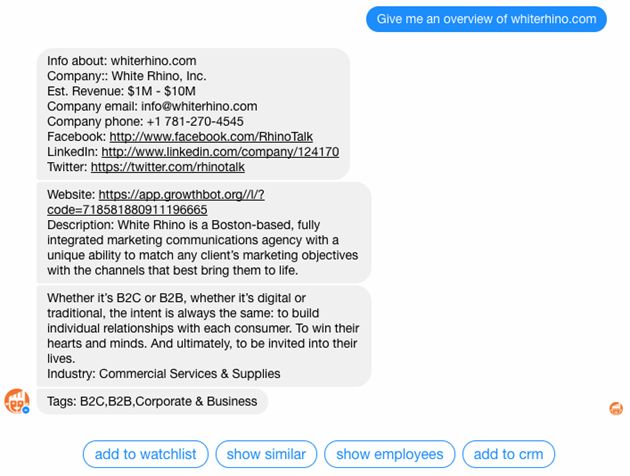
I liked this snapshot of a smart local branding and design agency, White Rhino. Pulled up from within Slack, this would be a good starting point for knowing who the company is and what it does. The "add to crm" integration option with Shah's HubSpot CRM system is noteworthy, too—if you're a subscriber.
That said, although the optional next steps sounded interesting, I had mixed results when I explored them. The promised "similar" companies were not similar at all, for instance. Also: I think that phone number will work, but it's not the one listed on the company website.
Rating: B, a good start with room for improvement. Shah would do well to look into his data sources, but marketers would also be wise to ensure all their information found online is accurate, on-brand, and consistent. An outdated LinkedIn profile, for example, might get tapped for data, and end up causing confusion.
2. 'What companies are similar to Skyword.com?'
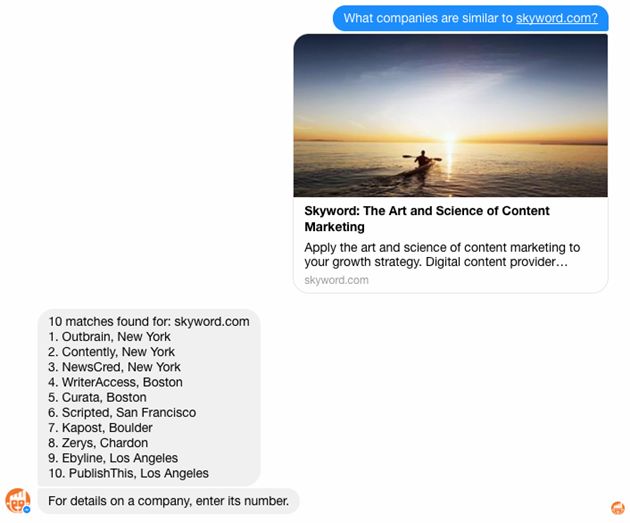
Local content marketing firm Skyword competes in a crowded market, no doubt. The list generated by GrowthBot would be a good starting point for research. Salespeople and job seekers would benefit from it, too. Though I can't vouch for the quality of the list, it seems reasonably accurate.
Rating: A, nicely done. Ideally, we'd know where these recommendations came from so we could gauge their quality.
3. 'What tech does Boston.com use?'
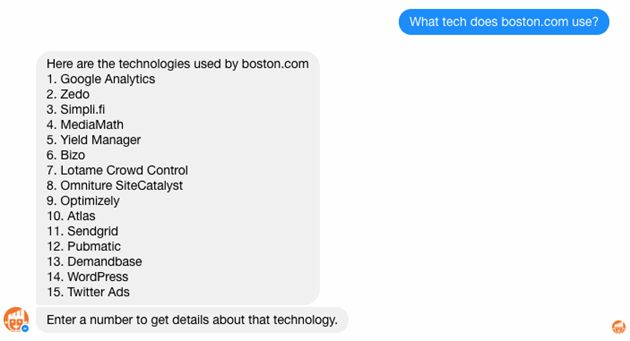
This peek into Boston.com's marketing technology stack intrigued me. It's not exhaustive, but it would be a good starting point for further investigation. I'm a fan of Demandbase's tools for anyone doing account-based marketing. Learning more about it, or the other technologies listed, is easy:
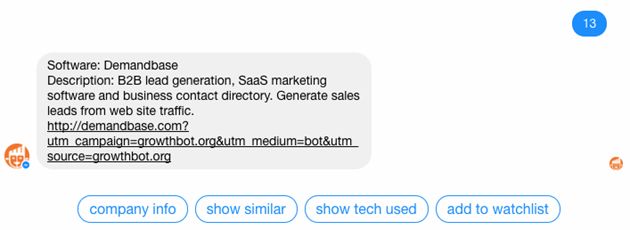
Rating: A+, very good. This could save me time. (Companies like BuiltWith and Wappalyzer have even more in-depth scans of anyone's marketing technology stack.)
4. 'Which keywords is UsefulArts.us ranking for?'
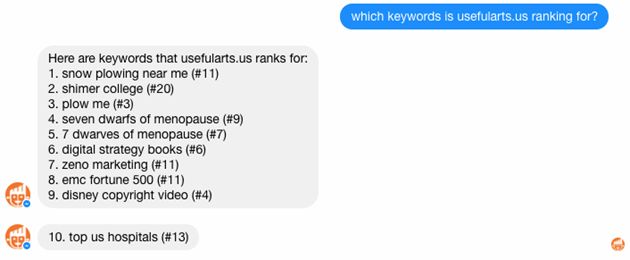
Dave Wieneke, digital strategist and author of UsefulArts.us, is a friend. The keywords that his blog ranks for definitely show the breadth of his eclectic interests, don't they? For content marketers, insights like these about a competitive website can help shape your SEO strategy as well as your editorial priorities.
Rating: A+, definitely a timesaver.
5. 'Which ad networks is Wayfair.com using?'
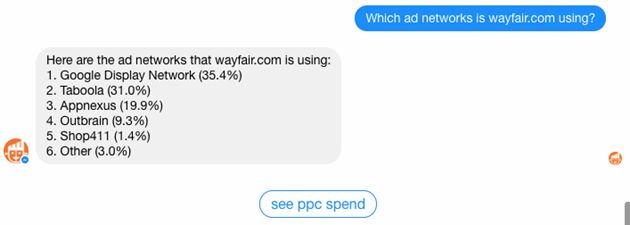
Knowing where your competitor is investing its online advertising dollars hints at where it's seeing success. As you'd expect, Wayfair's got a sophisticated approach; it's using multiple networks. Diving deeper into its estimated spend reveals more:

Wayfair's current PPC keywords and estimated click costs are the icing on the cake:
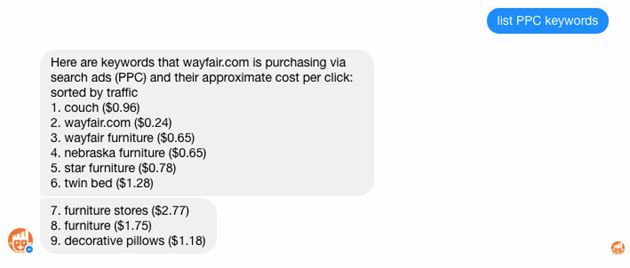
Rating: A+, super insightful—especially during budgeting and planning seasons.
6. 'Who are the top twitter followers of @Evergage?'

Understanding the social media profile of a buzzworthy website personalization platform like Evergage could be key if you're a competitor or potential client. How many followers does it have, and who are the top ones?

Rating: B, looking at the people Evergage chooses to follow would be more useful, I think. After all, you can't control who chooses to follow you. I asked, "Who does @Evergage follow on twitter?" and got a confused response. Shah promises us via email that he's hard at work on an improvement.
7. 'Look up email dharmesh@hubspot.com'
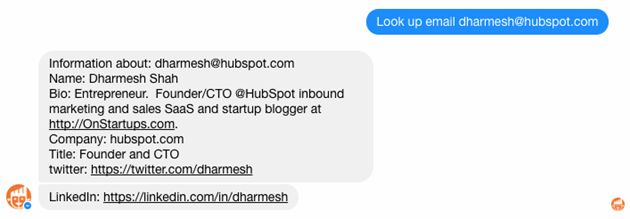
This research could be pure gold for anyone in sales and other lead generation roles! Preparing for a meeting, wouldn't it be nice to know who'll be on the call? Checking out their recent blog and Twitter posts never hurts, either.
Rating: A, works nicely; something I'd use.
8. Bonus: 'Tell me something funny'

Enough said! We all need more chuckles in our work lives!
Rating: A+, genius!
* * *
 So give Shah's GrowthBot a try. When you do, type "help" if you're struggling for questions to ask.
So give Shah's GrowthBot a try. When you do, type "help" if you're struggling for questions to ask.
Is it a perfect tool? Heck, no. At least, not yet. I'm told by email that Shah's improving the usefulness of Twitter-related questions—as I'd suggested. He hints that he's also adding intelligence about a company's tweeting analytics and about domain name registrations.
But even now, GrowthBot's a fascinating glimpse into chatbots and a potentially useful tool for any marketer looking for a better way to gather competitive intelligence.




